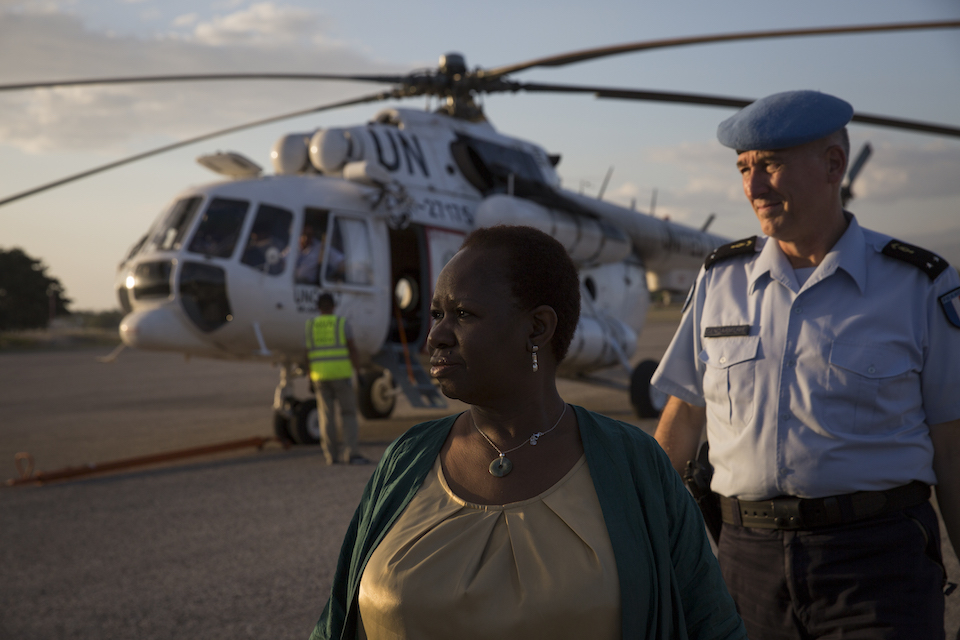The effects of human rights violations on the population and the political future of Haiti
Statement by Stephen Hickey, UK Political Co-ordinator at the UN, at the Security Council briefing on Haiti

Thank you, Mr President. This has been an especially rich and informative session on Haiti, thanks largely to our briefers this morning. I think the presence of the High Commissioner in the chamber today reminds us all that human rights are of vital importance both in their own right and across the other two pillars of the UN. We know that states that violate human rights are less prosperous, less stable, less able to meet the demands of their people and more likely to pose a threat to international peace and security.
Mr President, I want to focus on three issues today. First, on Women, Peace and Security. Ms Viaud drew our attention to the many barriers faced by women in Haiti, including a lack of access to healthcare, gender-based violence and a lack of access to justice. We strongly agree with the calls you made this morning, in particular for improved services to survivors of gender-based violence - especially for fair and safe access to justice - and for ensuring that whatever UN entity succeeds MINUJUSTH must ensure that any gains made on gender equality are preserved and should also support women’s protection and empowerment.
And I would also echo the call that you made for the improved participation of women in political life - a point made by my Belgian and Dominican colleagues. Surely this will help accelerate progress to securing improved rights, justice and access to services for women.
And I also agree that it’s very important that the UN in their reports to this Council should focus on this issue and update us on progress.
Second, turning to the human rights situation in Haiti, we very much agree with other speakers that whilst there has been progress in the human rights situation, that progress has been uneven and serious concerns remain. We welcome the work that hasbeen done on the development of a National Action Plan on Human Rights and the appointment of a ministerial level human rights focal point. And we welcome the other improvements mentioned in the Secretary-General’s report. However, at the same time, we remain concerned about the human rights abuses allegedly committed by the Haitian National Police during the demonstrations of October and November 2018, including allegations of summary executions. And it’s also a concern that according to the Secretary-General’s report, 74 percent of the prison population are still on pre-trial detention and a death rate of those in prison, according to this helpful handout from the UN, has actually increased from 11% to 14 %. Those concerns remain.
I want to emphasize that if Haiti is to accelerate on its path to stability and prosperity based on a reinforced social contract between the state and its citizens, then human rights need to come front and centre. And this is a particularly important elements of the shift away from peacekeeping to peace building that we really hope can be prioritised.
And in the spirit of interactivity, Mr President - you encourage us to ask questions - it would be useful to know from the UN when the results of the MINUJUSTH investigation of events at La Saline will be completed and hopefully made available to this Council.
Third and finally, on the question of the reconfiguration of the UN presence that many speakers have touched on, the UK broadly supports the Secretary-General’s proposal for MINUJUSTH to be succeeded by a special political mission. We especially welcome the fact that human rights and women’s protection and empowerment will be at the centre of this mandate. I hear very much the concerns of the Dominican Republic; It is important that this transition happens in a responsible and smooth way, taking account of the situation on the ground as we move from a peacekeeping presence to a special political mission.
And we’d like to reiterate our appreciation for the work of OHCHR, encourage all states to cooperate with them and offer them their full support. The UN has a clear role to play to ensure an integrated and sustainable transition, but it will ultimately be the government of Haiti’s leadership that will make this a success.
Thank you.